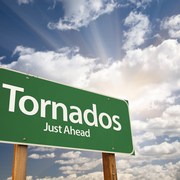 Andy Dean Photography/PhotoSpin
Andy Dean Photography/PhotoSpin
It might not be such a coincidence that Get Ready Day and National Preparedness Month both fall in September.
There have been a few natural disasters recently, including Hurricane Isaac and droughts in several regions.
Just in time for these natural disasters, information is available through these awareness events on how to get prepared for any worst-case scenarios.
This preparedness process includes emotional preparation, as well as coping with any emotions during and after emergencies.
For Get Ready Day on Sept. 18, 2012, the American Public Health Association provides fact sheets through its website to help every type of person get ready for any type of disaster or emergency.
One fact sheet provides information on how disasters impact mental health. According to the fact sheet, preparing for disasters can help promote good emotional health and allow for better coping and recovery from a disaster.
The website discusses some mental health symptoms people can experience after a disaster, and provides ways people can prepare for different disasters, and tips for recovering from disasters.
For National Preparedness Month, people are encouraged to visit the website www.ready.gov which is sponsored by FEMA and DHS.
The Ready campaign website provides information about how to prepare for various disasters, and includes a section about coping with different disasters and stress related to disasters.
It’s suggested that you become familiar with what disasters are more likely to happen in your area, and prepare accordingly.
Ramani Durvasula, a licensed clinical psychologist, gives her own suggestions for how to get prepared for a disaster without becoming over-stressed.
“Preparing for natural disasters can definitely incite feelings of anxiety in people with a propensity to anxiety - e.g. those with anxiety disorders, history of trauma or post-traumatic stress symptoms, or can also be associated with hopelessness and helplessness,” Durvasula said in an email.
“And this can certainly contribute to a sense of ‘denial’ or apathy or avoidance in the face of disaster preparation (remember - anxiety is all about avoidance).”
However, it’s important to prepare at least somewhat for disasters despite any anxiety or stress related to the preparation. A simple way to prepare is to buy pre-made kits for a variety of emergencies to avoid increased anxiety over the preparation process.
“[Preparation] can largely help because it can address real anxieties about clean water, food, etc,” Durvasula said. “With those real issues addressed, it makes it easier to simply focus on the psychological symptoms of anxiety and manage those
without worrying about being hungry.”
“It can also increase feelings of efficacy if the person was able to adequately prepare,” she added. “Preparation is also about psychological preparation - so talking about it and having a plan can sort of ‘inoculate’ the person against feeling out of control if and when the disaster hits.”
She also has suggestions for how to avoid “shutting down” during an actual disaster. Her first suggestion is to be prepared, because then basic needs are at least met during the disaster. If basic needs aren’t met, that’s when panic can result.
“Secondly, turn to support resources,” Durvasula said. “Preparing for disaster is not just about clean water and matches, but also about having a plan for who to call and how you will come together if the worst happens.”
For people on medication, especially for psychiatric conditions, it’s best to keep a reserve supply for emergencies as well.
She had one more suggestion for how to relieve some stress during an actual disaster. “[Learn] techniques you can turn to, such as breathing, relaxation, meditation and cognitive restructuring, as these can be drawn on in the midst of the crisis to reframe and retain a feeling of control,” Durvasula said.
Disasters in general can greatly impact mental health, and for some people already struggling with mental illnesses it can be the most devastating.
“In people with existing conditions, [disasters] can definitely result in a worsening of symptoms, such as higher anxiety, greater sense of panic, greater sense of hopelessness and diminished self-efficacy,” Durvasula said.
“It may result in disruptions of routine, which can be particularly trying for children, the mothers who take care of them, and people who are struggling with psychiatric symptoms or disorders.”
However, there might be some positive results from the aftermath of a disaster.
“[On the] bright side, sometimes [there is] a call to arms, and people may come together and create community in unprecedented ways,” Durvasula said. “This can sometimes result in finding meaning and purpose in such situations and a real psychological ‘call to arms.’”
Sources:
American Public Health Association. Get the facts: Ready-to-use materials from APHA’s Get Ready campaign. Web. Sept. 12, 2012.
http://www.getreadyforflu.org/new_pg_facts.htm
Ready.gov. FEMA. Coping with disaster. Web. Sept. 13, 2012.
http://www.ready.gov/coping-with-disaster
Durvasula, Ramani. Email interview. August 31, 2012.
http://www.doctor-ramani.com/index/about
Reviewed September 13, 2012
by Michele Blacksberg RN
Edited by Jody Smith




Add a CommentComments
There are no comments yet. Be the first one and get the conversation started!